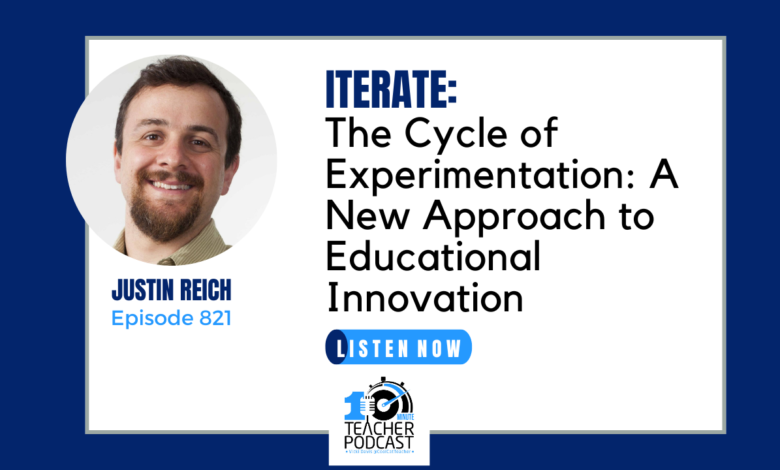A New Approach to Educational Innovation

Transcript was generated by AI. I’ve checked it, but if you find any mistakes, please just leave a comment, and I’ll double check it! Thanks so much! – Vicki
00;00;00;00 – 00;00;29;02
Vicki Davis
The Cycle of Experimentation. A New Approach to Educational Innovation. Episode 821 Today’s guest Justin Reich, author of Iterate The Secret to Innovation in Schools, will be a guest on the Modern Classrooms webinar series. The sponsor of today’s episode. Stay tuned at the end of the show to see how you can learn more about innovative instructional strategies that you’ll learn in today’s show.
00;00;29;04 – 00;00;31;21
Vicki Davis
Now on with the show.
00;00;31;23 – 00;00;36;22
John Davis, Producer
This is the Ten Minute Teacher podcast with your host, Vicki Davis.
00;00;36;24 – 00;01;01;16
Vicki Davis
I’m so excited today to talk to my friend, Dr. Justin Reich. He is an associate professor of digital media in the Comparative Media Studies and Writing Department of M.I.T. and Director of Teaching Systems Lab. He is the author of the book Innovate The Secret to Innovation in Schools. Justin, you and I have known each other for quite some time, and it’s just exciting to see all the innovations that you’ve worked with.
00;01;01;16 – 00;01;04;09
Vicki Davis
But we’ve known each other for, what, maybe ten years now.
00;01;04;11 – 00;01;12;12
Justin Reich
I probably was first visiting your classroom about 15 years ago. I bet 2008 was the first time I came down to Georgia to see all the cool stuff that you’re up to.
00;01;12;13 – 00;01;23;19
Vicki Davis
Vicki Let’s talk about Iterate. So how do schools iterate? Is this just like a secret for principals that a principal can just come in and change a school or give us the background of leadership?
00;01;23;22 – 00;01;48;12
Justin Reich
Vicki That’s never how teaching and learning get better. There are all kinds of good things that principals can do. Still, the only people who can make teaching and learning better are classroom teachers, our paraprofessionals, our librarians, or the people who are actually working with students every day. You know, a colleague at Harvard, Richard Elmore, described the instructional core, which our students and teachers and the resources that they use to learn.
00;01;48;13 – 00;02;17;22
Justin Reich
And if you want to make learning better, you’ve got to mess around with one of those three things. And there just aren’t enough principals in the building to make teaching better. In Mandarin and sixth grade Earth science and third grade and everything else that you have going on. So Iterate is really a book about teacher leadership, about the incredibly important roles that teachers play in experimenting and bringing new ideas to life, improving schools, and the way that coaches and consultants and principals can help and support teachers in doing that incredibly important work.
00;02;17;24 – 00;02;29;11
Vicki Davis
You have three approaches. Just give us an overview of those because you know we’re all going to want to get the work to see exactly the details about how to do this. I’m sure you have lots of examples.
00;02;29;15 – 00;02;51;05
Justin Reich
So the book starts with the cycle of experiment and peer learning, which is a set of ideas I’ve been working on for 15 years, visiting classrooms like yours. And it just observes that if teaching gets better, it’s because of new practices. New practices come from teachers, teachers. The only people who actually iterate, improve teaching now interview teachers and ask them who has the most influence on your practice?
00;02;51;06 – 00;03;11;19
Justin Reich
And the number one answer you will get is other teachers. When good ideas move throughout a school, they move peer to peer. They move from one teacher to another. So if you’re an educator, if you’re a classroom teacher, that means you have an incredibly important opportunity to serve as a teacher leader, to be trying new things, to be sharing what you learn with your colleagues.
00;03;11;24 – 00;03;37;27
Justin Reich
And if you’re a principal, the number one thing that you can do to accelerate innovation in your school is create the conditions for teachers to conduct research, to do experiments and to share. So the second part of the book is design thinking for leading and learning. We’ve learned a lot over the past two decades about effective ways to experiment and to iterate based on lots of conversations with my colleagues here in engineering and aero Astro in the business school, in the Media Lab.
00;03;38;04 – 00;04;01;27
Justin Reich
I’ve tried to pull together some of the best ideas we have about effective approaches to experimentation, hypothesis, develop prototyping, imagining, testing, all those kinds of things. And then the third part of the book is the collaborative innovation cycle. It’s good to have teachers experiment. The most powerful circumstances, though, are when teachers are experimenting on the same kinds of things together, when we’re pulling our orders in the same direction.
00;04;02;00 – 00;04;19;01
Justin Reich
So that is somebody trying something in the math department. It can influence what the other math teachers are doing. It can influence what’s happening in the science department. It can give us a sense that we’re working on something together. And as a leader, you can’t just impose those ideas on schools because teachers have all kinds of beliefs about what they value and what good practices.
00;04;19;01 – 00;04;37;05
Justin Reich
So it’s really about bringing people together around ideas they care about. It’s about fixing our problems, but also really recognizing and building on our strengths. So those three approaches, the cycle of experiment, pure learning, design, thinking for leading and learning and the collaborative innovation cycle, those are the three actionable toolkits that teachers and leaders are going to learn about in the book.
00;04;37;05 – 00;04;54;03
Vicki Davis
So let’s talk about an important topic, risk and failure. That’s part of the experimentation process, right? Because I know sometimes when I try new things, they fall flat on their face. Now, I usually tell the kids that we’re trying something new, which I guess you could argue is the Hawthorne experiment, where they turned out the lights and productivity went up.
00;04;54;03 – 00;05;19;10
Vicki Davis
They turned down the lights and productivity went out because the studying caused things to happen. But you could even argue that the act of experimenting actually could improve things in that way. But some teachers are afraid to fail. I mean, what if my principal comes in to observe me when I’m trying something new? Or what if the experiment just doesn’t go quite right and I have to go and I get off my pace because I have to reteach it the way that I used to do it.
00;05;19;10 – 00;05;20;24
Vicki Davis
What do you say about that?
00;05;20;24 – 00;05;41;24
Justin Reich
Well, teachers are experimenting all the time. There are very few teachers who do the exact same thing year after year after year. And so part of what we want to do is just be systematic about how we’re doing that. I would say a big thing that I work with schools, with educators, with teachers on, especially as they’re starting doing more of this intentionally, is our earliest experiments.
00;05;41;24 – 00;05;59;10
Justin Reich
We really want to think about how they can be small and lightweight and simple so that when they fail, it doesn’t feel catastrophic. You know, sometimes we have folks who like rebuild entire curriculum, rebuild entire units as a place to start. And when those things fail, it’s a huge drag because you took a big bet on a big chunk.
00;05;59;13 – 00;06;16;13
Justin Reich
Part of what I want people to think about is like, how can we start with smaller bets? How can we validate ideas with smaller, lightweight experiments? Maybe we’re not doing them with the whole class. Maybe we’re doing them with a few students. Maybe we’re doing them as part of an afterschool activity. Maybe we give students a little bit of extra credit, too, to try something new.
00;06;16;21 – 00;06;47;08
Justin Reich
And then once we identify some ideas that seem more promising, then we build up to larger and bigger experiments. So schools have this oftentimes have this sort of real linear mindset towards change. There are a lot of schools that have five year plans that have sort of big long term thinking about change. And part of the book is trying to shift from thinking about the sort of lines and climbing mountains to two circles and spirals, what are small, lightweight experiments that we can conduct that will make our schools better, and how can we build on all those things?
00;06;47;09 – 00;07;02;17 Dr. Justin Reich The way I describe it is a someday Monday dilemma, like we want big change in the long run in schools, but we can’t send all the kids home for three weeks to try something new. Like everything we try has to be able to work on Monday. We have to get to some day through a series of manageable Monday kinds of experiments.
00;07;02;19 – 00;07;20;26 Vicki Davis Oh, I love that. What a great soundbite there. So I want you to travel back in time. You’ve been observing classrooms for a long time, and so I’m sure that the thoughts that go into iterate are from classroom observations, travel back in time to younger Justin and describe when the lightbulb started going on about how actual iteration happens in schools.
00;07;20;27 – 00;07;22;04 Vicki Davis Can you describe that moment?
00;07;22;04 – 00;07;42;22
Justin Reich I write about some in the book. One of the schools that most struck me was a school I visited in Southern California. It was right around the time that collaborative writing tools like Google Docs were just really first starting to be introduced. I have visited many, many schools that have made enormous investments in technology and very little changed in teaching and learning.
00;07;42;22 – 00;07;55;21
Justin Reich You know, you go to some of the earliest schools that bought lots of iPads for their students and you go and you interview the students and you say, well, what do you like most about having this new technology? And they’re like, oh, man, I love being able to take all my notes in one device instead of having five notebooks.
00;07;55;21 – 00;08;19;01
Justin Reich
And you think to yourself, like, that’s just not worth 800 bucks. A kid. To consolidate notebooks like that is not change. But I visited a school in Southern California, and it really seemed like they were doing writing differently, not just in the classes I visited, but students could tell me across their classes they were making more drafts. They were collaborating with each other like they had adopted these new set of practices that really seemed to be improving students ability to write across the disciplines.
00;08;19;01 – 00;08;35;15
Justin Reich
I couldn’t understand why this school had changed so much and why others seemed to be stuck, why the technology would fall from the sky but not really change things. So I’m interviewing the teachers and I say, Well, how did the principals help you? How to school leadership help you? And they say, Wow, I don’t even think they know what we’re doing.
00;08;35;15 – 00;08;53;0
Justin Reich
And I was like, What? Like how do I visit one of the only schools where I feel like things are really changing and like the principals are just happily like making the busses run on time and making sure the air conditioners are working. It doesn’t make any sense. It doesn’t make any sense until you realize that teacher leadership is the centerpiece of instructional improvement.
00;08;53;01 – 00;09;12;01
Justin Reich
Like what those colleagues were really good at doing was trying new things, sharing what they had learned with one another, visiting each other’s classrooms, looking at each other’s student work. And so these practices that started in a handful of classrooms didn’t just, you know, all the time tech makes things better in one classroom here or there or wherever.
00;09;12;01 – 00;09;27;03
Justin Reich But it’s only when we get this sort of continuous improvement, lots of sharing and peer learning that we see whole departments, whole grade levels, whole teams change. So that was a school that really helped me understand just how essential teacher leadership was to making teaching and learning better.
00;09;27;06 – 00;09;49;21
Vicki Davis You know, a lot has been written just in about teacher dissatisfaction. All the teachers who have left teaching the workload of teachers, which just all the duties and such. And I really absolutely believe that what you’re talking about is a way to bring the joy back to teaching. But something’s got to change because the bandwidth teachers have is so limited to talk to each other even.



